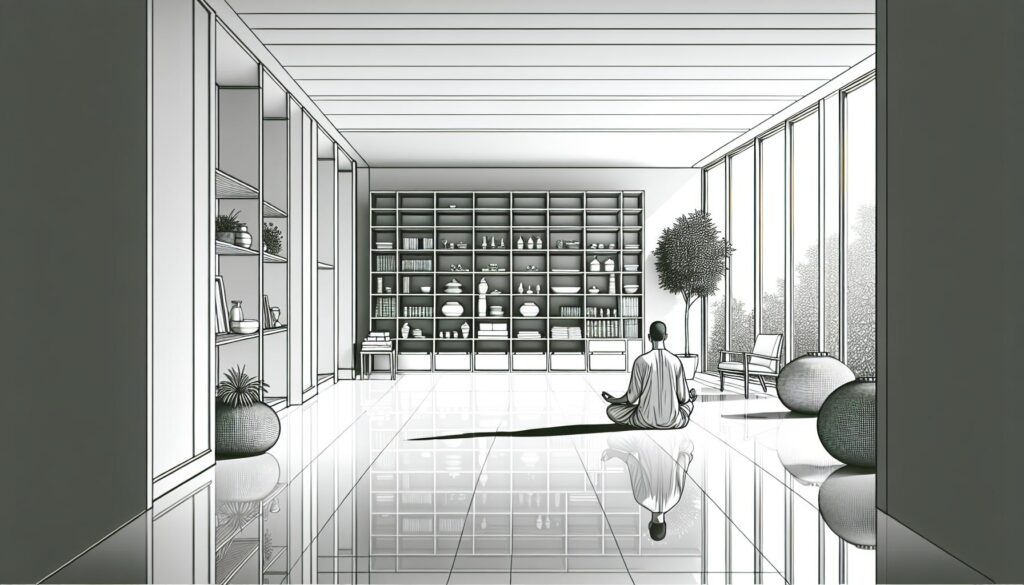In today’s fast-paced world, it’s easy to get caught up in the hustle and bustle, and before you know it, you’re surrounded by clutter. Not just physical clutter, but mental clutter too. That’s where minimalism steps in. It’s not just about having fewer possessions. It’s about making room for what truly matters.
Living a minimalist lifestyle doesn’t mean you have to give up all your belongings and live in an empty room. It’s about making intentional decisions, decluttering your life, and focusing on the essentials. It’s about finding joy in simplicity and understanding that less can indeed be more.
Imagine waking up to a clean, clutter-free room, having a clear mind, and feeling a sense of freedom from the constant need to acquire more. That’s the power of minimalism. It’s a lifestyle that I’ve embraced, and it’s transformed my life in ways I never thought possible.
Key Takeaways
- Minimalism is not just about having fewer possessions but about making room for what truly matters in life, focusing on essentials, and finding joy in simplicity.
- In essence, minimalism lies at the crossroads of simplicity and intentionality. It involves making conscious decisions about what you let into your life, understanding what matters, and eliminating the excess that does not contribute to your happiness or growth.
- Embracing minimalism can bring numerous benefits like reducing stress, boosting productivity, encouraging mindful consumption, leading to greater financial freedom, and facilitating personal growth and self-fulfillment.
- Practical decluttering and simplifying strategies start with organizing your physical and digital space, then move towards streamlining lifestyle routines and decluttering your mindset from unproductive habits and unnecessary societal pressures.
- Implementing practical minimalist living tips can aid in leading a simpler lifestyle. Key tips include evaluating possessions for their value, adopting intentional buying, managing digital clutter, implementing simple eating and planned meal shopping, and setting clear boundaries between work and personal time.
- Embracing minimalism in different life areas including home, work, food and diet, digital space, and mental and emotional spaces can promote clarity, focus, freedom from stress, and overall well-being.
The Essence of Minimalism
When we speak of minimalism, it’s more than just an aesthetic or a design principle. Minimalism is a philosophy, a lifestyle choice that brings a sense of order not just to your physical surroundings but also to your inner world.
Minimalism’s essence sits at a crossroad, where simplicity meets intentionality. It’s about making conscious decisions about what you let into your life. It’s not about living with the bare minimum or getting rid of every worldly possession. Instead, it’s about understanding what truly matters and shedding the extra weight that doesn’t contribute to your happiness or growth.
Think of your life as a precious work of art. Would you randomly splatter colors all over it, or would you carefully choose each stroke so it contributes to a beautiful overall masterpiece? Mini analyses this concept, creating a cleaner, more meaningful life infused with joy and fulfilment.
As a minimalist, I’ve found that grace lies in the elimination of excess, not its accumulation. By practicing this concept, I’ve discovered an uncluttered environment is conducive to transparency, leading to a clear mind and an elevated way of life. It’s transformed my life, gifting me with a renewed sense of freedom and a deep appreciation for the things I have rather than a constant longing for more.
In this journey, it’s essential to take gradual steps, as transformative practices take time to become habits. Start by decluttering your immediate environment. Then, slowly move towards mental decluttering by eliminating unnecessary worries, regaining control of your time, and focusing on critical thoughts and emotions.
Our first taste of minimalism might seem boring or melancholic, but over time, we find that in stripping away, we reveal – revealing our true selves, our authentic desires, and a purposeful life. And soon, this simplicity doesn’t feel like a compromise but a blissful state of existence where you enjoy the essential, valuable things in life.
While minimalism differs for every person, its core remains: simplicity, intentionality, and the joy of less is more.
Benefits of Embracing Minimalism
After understanding the core principles of minimalism, let’s explore the numerous benefits this lifestyle offers. Living with less isn’t just about space efficiency; there are profound psychological and emotional rewards as well.
To begin with, minimalism can reduce stress. The act of decluttering, both physically and mentally, removes unnecessary sources of tension. When there’s less to clean, organize, or worry about, I’m free to focus on what truly matters. It’s a breath of fresh air – a true decluttered space brings clarity and a sense of peace.
Boosting productivity is another crucial advantage. In a minimalist environment, there’s less scope for distractions. The simplicity of my surroundings helps maintain focus, leading to better efficiency in undertaking tasks. So goodbye to wasted time, and hello to maximized productivity!
Minimalism also encourages mindful consumption. It’s not about deprivation, but rather making thoughtful decisions about what enters my life. By choosing quality over quantity, I maintain a satisfying and sustainable lifestyle that respects the environment.
Interestingly, minimalism can lead to greater financial freedom. By purchasing less and focusing on needs over wants, I’ve found more room in my budget. It’s given me control over my finances and a deeper understanding of monetary value.
Lastly, minimalism facilitates personal growth. As I let go of material possessions, I’ve found room to focus on my passions, relationships, and self-improvement. That’s self-fulfillment in the truest sense.
In essence, embracing the minimalist lifestyle isn’t just about having fewer things. It’s about cutting the clutter to experience more joy, meaning, and fulfillment. The following table summarizes the key benefits of minimalism:
| Benefits of Minimalism | Description |
|---|---|
| Reduced Stress | Less clutter means less tension. |
| Increased Productivity | Fewer distractions lead to better focus. |
| Mindful Consumption | Thoughtful decisions about purchases and their impacts. |
| Financial Freedom | Saving money by focusing on needs over wants. |
| Personal Growth | More focus on self-improvement and relationships. |
How to Declutter and Simplify
Progressing on our minimalism journey, it’s essential to hone in on decluttering and simplifying strategies. Simplifying your life isn’t about throwing everything away, but making deliberate decisions about what to keep based on the value it brings into your life.
Start with your physical space. Tidy up your living areas and organize your workspace. Here are quick three steps to achieve this:
- Remove all items from the chosen area.
- Examine each item for utility, reviewing its purpose and importance.
- Only keep items that serve a function or resonate with joy.
Afterwards, venture into your digital world. Clear your inbox, manage your subscriptions, and delete unused apps. Digital clutter often adds to mental stress. Be mindful when downloading new apps or subscribing to channels.
Next, focus on simplifying your lifestyle. This could mean many things – from streamlining your morning routine to optimizing shopping habits. Choose to buy fewer, but better-quality items. Invest in multitasking household products. Plan meals ahead to avoid last-minute, unhealthy food choices. These steps might seem small but they can significantly deescalate daily anxieties.
Shifting to decluttering your mindset might be challenging but it’s a crucial step. Detach from unproductive habits, negative mindset, and unnecessary societal pressures. Practice mindfulness. It’s an essential tool to help detach from habitual, unserving patterns and cultivate a peaceful, focused mind.
As you tread this path, remember that minimalism isn’t about deprivation; it’s about enabling abundance in its true essence. Have patience with yourself. Cultivate discernment over judgement. And enjoy the process, knowing that every step brings you closer towards a clutter-free, simplified life.
Practical Minimalist Living Tips
As we journey through this path of minimalism, implementing practical strategies into everyday life is crucial. These real-world tips can guide you to embrace a simpler lifestyle rooted in intention and purpose.
Evaluate your possessions. Minimalism is not about having the least amount of things; it’s about having the right things. Take time to assess your belongings. Do your clothes, books, or decor add value? If not, consider their purpose and make a decision to keep, donate, or discard. A clutter-free space not only looks aesthetically pleasing but also enhances productivity and peacefulness.
The concept of essentialism can guide you towards intentional buying. Every purchase matters. Question if you truly need an item before buying it. This habit is not only beneficial for your pockets but also for the environment. Browsing becomes purposeful shopping and impulsive buys will decrease.
The realm of digital minimalism is vast as well. Digital decluttering includes managing files, bookmarks, and emails, besides curating your social media intake. It’s essential for maintaining a stress-free digital environment. Opting for paperless options also aid in reducing physical clutter.
When it comes to food habits, simple eating can be a game-changer. Plan meals and shop from a pre-determined list. This healthier practice saves time, reduces food waste, and paves the way for a sustainable lifestyle. Moreover, limit your dining out times as home-cooked meals are often healthier and cheaper.
Furthermore, firmly set boundaries between work and personal time. Keeping a dedicated workspace, allocating specific hours of work, taking regular breaks, and practicing a hobby can improve work-life balance. These practices can enhance job satisfaction, reduce stress and increase overall wellbeing.
In a nutshell, minimalism is a mindful approach to living. It’s making simple, meaningful decisions about everything that we own or do. Now, let’s take a look at how maintaining a minimalist mindset can foster mental and emotional well-being.
Embracing Minimalism in Different Areas of Life
Transitioning into a minimalist lifestyle calls for adjusting habits and mindsets across a variety of life’s aspects. Let’s explore a few of these areas and find ways to incorporate minimalist values.
Home and Possessions
Love for ‘more’ often finds its way into our homes, leading to clutter and stress. Let’s bring minimalism into the home by reevaluating our possessions. Keep only what’s valuable, bringing joy or serving a purpose. This is not about deprivation, it’s the practice of essentialism.
Work and Career
Work can sometimes take over our lives. With minimalism, we set boundaries between work and personal life. I suggest prioritizing tasks, eliminating unnecessary meetings, and saying a bold NO to excessive multitasking. A decluttered work life leads to increased productivity and less stress.
Food and Diet
Embracing simple eating habits is a fantastic way to incorporate minimalism in our diet. Eating should be straightforward. Choose organic, wholesome foods that nourish your body and dismiss the notion that variety equates to bliss.
Digital Zone
‘Technostress’ is real and damaging. Let’s practice digital decluttering to minimize our cyber distractions. Simplify your digital spaces by closing unused accounts, unsubscribing from unnecessary emails, and setting screen-time boundaries.
Mental and Emotional Spaces
Minimalism isn’t just about physical possessions. It’s a mindful approach that also involves mental and emotional well-being. Practicing mindfulness, focusing on the present, and learning to appreciate simple joys can transform how we perceive and react to the world.
Ultimately, embracing a minimalist lifestyle in various aspects of life requires making intentional decisions about what truly matters. This approach helps promote harmony and freedom, steering away from stress and chaos. By identifying what holds value in our lives we are empowered to live with more clarity, focus, and purpose.
Conclusion
Embracing minimalism isn’t just about decluttering your space. It’s a holistic approach that can touch every corner of your life. From simplifying your diet to setting work-life boundaries to practicing digital detox, it’s about making intentional decisions that bring clarity and purpose. It’s about letting go of the excess to make room for what truly matters. So here’s to a minimalist lifestyle – one that brings harmony, reduces stress, and promotes well-being. Remember, it’s not a one-size-fits-all journey. It’s your journey, tailored to your needs and preferences. And as you embark on this path, you’ll find that less truly can be more.



